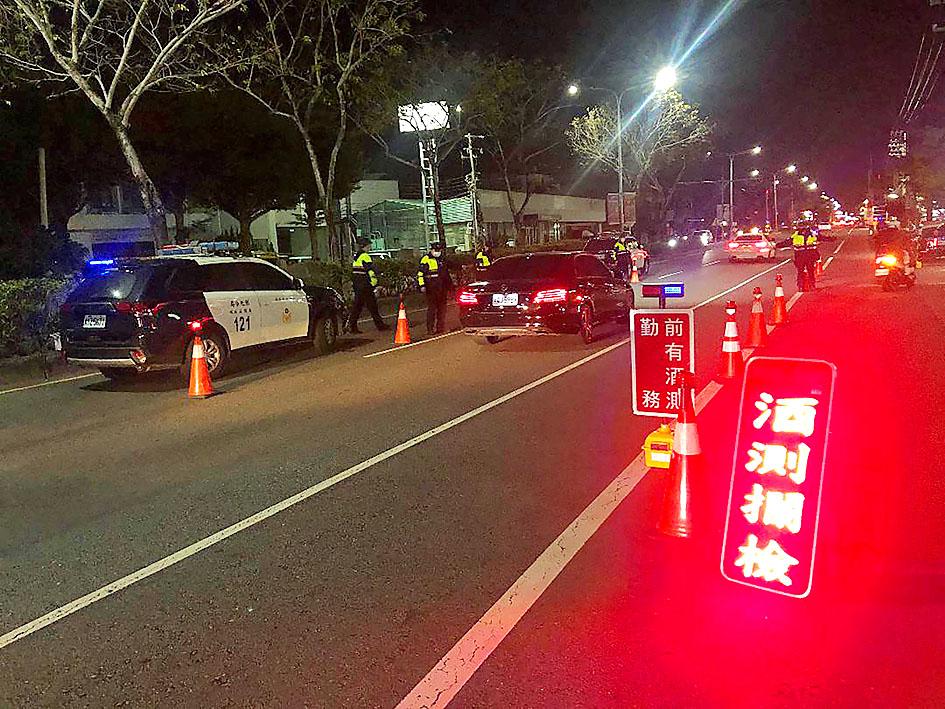The Executive Yuan yesterday approved a draft amendment that would regard driving a vehicle under the influence of narcotics as an “offense against public safety” with a maximum three-year sentence and NT$30,000 fine.
Tests for drivers suspected of being under the influence of narcotics would be based on urinalysis, regardless of whether a driver was operating a vehicle dangerously or was involved in an accident.
The Executive Yuan said its approval of the proposed amendment showed the government’s “zero tolerance policy toward narcotics, deterring drug users from operating motor vehicles in a way that causes danger to other people.”

Photo courtesy of the Changhua County Police Department
The draft amendment aims to address concerns that the code’s threshold for determining drug use in drivers is too limiting to be effective, officials said.
However, they assured that police officers would not conduct random drug testing on drivers, but would base decisions on individual cases or conditions, such as discovering narcotics or paraphernalia in vehicles.
Article 185-3 of the Criminal Code says: “A person who uses drugs, narcotics or similar substances that prevent a person from driving safely” could be charged with an “offense against public safety” and face a three-year sentence, with a possible NT$30,000 fine.
The amendment was drafted after public safety advocacy groups said that driving under the influence of drugs is as serious as drunk driving and should have its legal threshold lowered, officials said.
The draft amendment is to be forwarded to the Legislative Yuan for approval.
Additional reporting by Jason Pan

A preclearance service to facilitate entry for people traveling to select airports in Japan would be available from Thursday next week to Feb. 25 at Taiwan Taoyuan International Airport, Taoyuan International Airport Corp (TIAC) said on Tuesday. The service was first made available to Taiwanese travelers throughout the winter vacation of 2024 and during the Lunar New Year holiday. In addition to flights to the Japanese cities of Hakodate, Asahikawa, Akita, Sendai, Niigata, Okayama, Takamatsu, Kumamoto and Kagoshima, the service would be available to travelers to Kobe and Oita. The service can be accessed by passengers of 15 flight routes operated by

Chinese spouse and influencer Guan Guan’s (關關) residency permit has been revoked for repeatedly posting pro-China videos that threaten national security, the National Immigration Agency confirmed today. Guan Guan has said many controversial statements in her videos posted to Douyin (抖音), including “the red flag will soon be painted all over Taiwan” and “Taiwan is an inseparable part of China,” and expressing hope for expedited reunification. The agency last year received multiple reports alleging that Guan Guan had advocated for armed reunification. After verifying the reports, the agency last month issued a notice requiring her to appear and explain her actions. Guan

GIVE AND TAKE: Blood demand continues to rise each year, while fewer young donors are available due to the nation’s falling birthrate, a doctor said Blood donors can redeem points earned from donations to obtain limited edition Formosan black bear travel mugs, the Kaohsiung Blood Center said yesterday, as it announced a goal of stocking 20,000 units of blood prior to the Lunar New Year. The last month of the lunar year is National Blood Donation Month, when local centers seek to stockpile blood for use during the Lunar New Year holiday. The blood demand in southern Taiwan — including Tainan and Kaohsiung, as well as Chiayi, Pingtung, Penghu and Taitung counties — is about 2,000 units per day, the center said. The donation campaign aims to boost

The Central Weather Administration (CWA) said a magnitude 4.9 earthquake that struck off the coast of eastern Taiwan yesterday was an independent event and part of a stress-adjustment process. The earthquake occurred at 4:47pm, with its epicenter at sea about 45.4km south of Yilan County Hall at a depth of 5.9km, the CWA said. The quake's intensity, which gauges the actual effects of a temblor, was highest in several townships in Yilan and neighboring Hualien County, where it measured 4 on Taiwan's seven-tier intensity scale, the CWA said. Lin Po-yu (林柏佑), a division chief at the CWA's Seismological Center, told a news conference